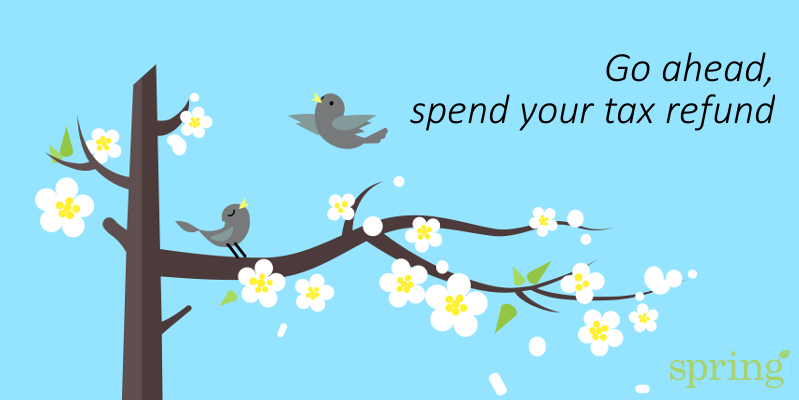This article was written by Sandi Martin from Spring Personal Finance and was originally published here on March 29th 2016.
Ah, spring. The time of year when flowers bloom, birds sing, and the entire internet starts yelling at you for getting a tax refund or – even worse – getting a tax refund and then spending it.
The horror.
The conventional wisdom goes something like this: You shouldn’t get a tax refund, because it means that your HR department deducted too much tax from your paycheque, and you’ve been giving the government a tax-loan all year, you dummy.
Or this: The only thing you should spend your tax refund on is an RRSP contribution, because then your taxes will be lower this year, too, creating a virtuous circle of lower taxes for your income-earning lifetime. (You dummy.)
They’re all missing the point.
The problem here is one that finance writers themselves caution you against: your tax refund isn’t somehow a separate class of money than the stuff that’s deposited to your bank account every two weeks, and thinking about it differently than you think about your paycheque leads to the finger-wagging advice above…or a guilty feeling for not following it.
Let’s think of it in a different way, and maybe it will help: your tax refund is part of last year’s income, and you’re getting it today instead of with your paycheques last year. What would you have done with it if you’d been getting it all year rather than a month from now?
This is a good argument for asking to reduce your income tax deductions at source if you regularly get a refund because you pay union dues, childcare costs, contribute to your RRSP or donate to charity (among other things). Not because of the interest-free government loan malarky, but because you’ll be able to spend the income you earn when you earn it, instead of the following year. Be careful, though: if you’re not totally sure that you’ve calculated correctly, or that your tax situation this year will be the same as last year, maybe a tax free loan to the government with a refund in April is a better scenario than the reverse, especially if the resulting tax bill comes as a surprise.
Let me put it another way: what’s the goal of paying less in taxes? If your answer is “ummm…to pay less taxes?”…think of the possibilities you’re missing! (Also, you’d be a great finance writer.) Unless your goal in life is to stick it to the man, or to stop funding Provincial Program X or Federal Program Y (good luck with that, by the way), you probably want to give the government less of your money so you can use it to do the things you want to do with it.
Take the big picture view, and look at a refund as just another piece of your total income pie (mmmm….pie….). Use the total pie to spend on the things that are important to you, whether that’s as part of your overall debt reduction efforts, saving to quit your job, or finally paying for that activity your kids have been dying to join.
Treating your income tax refund as a special class of money that can only be used to do virtuous things actually encourages the other bad behaviours finance writers are bugging you about all the time: you’re in danger of relying on a future windfall to solve your spending or saving problems.
Don’t do that.
